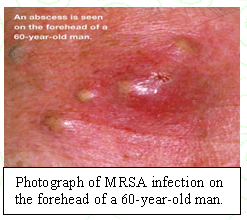In response to the growing problem of bacterial resistance, researchers have launched efforts to find new and better ways to defeat these uni-cellular pests, without the use of traditional antibiotics. A study conducted by The Robert Wood Johnson Foundation (RWJF) in conjunction with the Plexus Institute evaluated positive deviance, a novel prevention approach to change social behaviors, to lessen incidences of multifaceted methicillin-resistant Staphylococcus aureus (MRSA) infections in participating hospitals. Results of the study show that MRSA infections were dropped 26-62% in hospitals employing positive deviance.

Staphylococcus is a common bacterium, and the resistant strain is often found in areas where there are a large number of people, and is common for people working or staying in hospitals to pick up an unwanted and hard to treat infection as a result. Results of this study are considerable due to the methods that focus on prevention as opposed to only treatment.
"Reports of successful multicenter interventions to reduce endemic antimicrobial resistance problems among U.S. hospitals are extremely rare," says John A. Jernigan, MD, MS, an epidemiologist at the national Centers for Disease Control and Prevention (CDC). "These extremely encouraging findings add to a growing body of evidence that hospitals can make a difference in their endemic MRSA rates, and further might be able to improve the chances that infected patients have the best possible treatment options available. It shows that hospitals can make an important difference in antimicrobial resistance even at a time when the availability of new antibiotics has stagnated."The concept of Positive Deviance, brought about in 2006, is based upon beliefs that infections can be contained, and reduction of transmission can be greatly lowered through the diligence of hospital staff and others who could help control infections.

Photo credit: Indiana University-Purdue University, Indianapolis
It is estimated that nearly 100,000 people develop invasive MRSA infections each year, resulting in approximately 19,000 deaths. Of these infections, about 86 percent are health care-associated.
References:




Comments